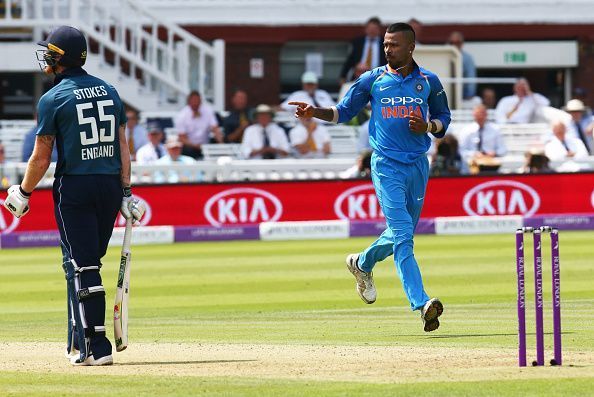
Hardik Pandya's performances in ODIs - A Statistical Analysis
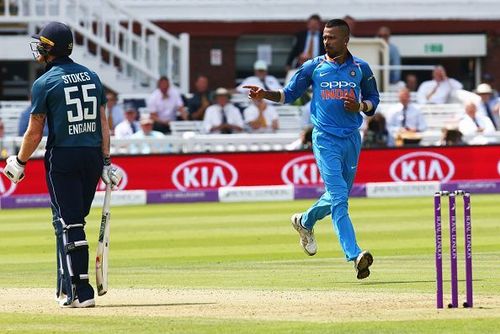
On May 8th 2015, in yet another thriller in the IPL, Mumbai Indians required 30 off the last 2 overs against Chennai Super Kings to keep their playoff hopes alive. When one thought that MI were down and out, in came a player who literally stunned the audience and fans alike in the next few minutes. Hardik Pandya, then just a youngster from Baroda, had just smoked 3 huge sixes straight down the ground off Negi’s bowling. These blows tilted the game towards MI’s favour just in a matter of 4 deliveries. That knock from Pandya got him into limelight and people were looking at him as a future Indian prospect in T20s. 3 years down the lane, Pandya has grown in leaps and bounds as he has established himself as a regular in the T20 and ODI team, with all-round performances to his name on a regular basis. Having made his test debut about a year back, he is slowly coming up the ranks with some promising performances in his short career till now. Having been a part of the ODI team for almost 2 years, it would be exciting to look at his growth and analyze his role in the team, especially with the World Cup less than a year away.
#1. BATTING
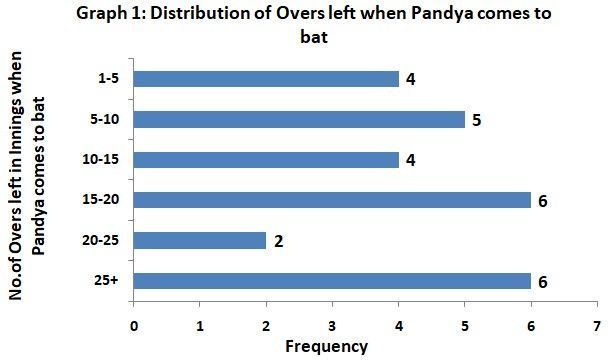
For a player who predominantly comes in to bat at No.7, he has been exposed to situations where he had to play out a few overs before going for the big hits. In more than half of his knocks (14), he had at least 15 overs to play out in the innings. This means, he got time to build a proper innings on half of the occasions. 2/3rd of his knocks (18) saw him coming to the crease with 10 or more overs left, implying that he had to play sensibly for a while before slogging. A player who started off primarily as as a pinch-hitter or slogger was given a chance to play more like a proper batsman many a times. Despite a few occasions where he was promoted to No.4 or 5, this situation could be attributed mainly to the struggles that the Indians have faced in the middle order department in the last two years.
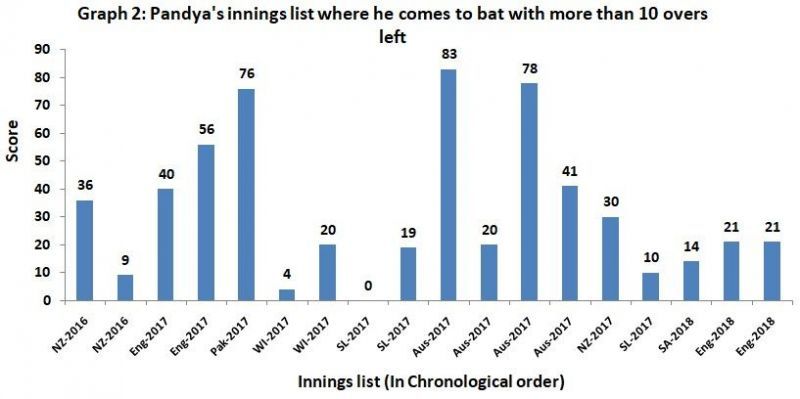
Pandya has actually played quite a few genuinely good knocks as a proper batsman. In his very first ODI innings, he made a good 36(32) in a tricky run chase against NZ. India needed 71 off 63 and with 4 wickets in hand when he came to bat and he batted well with the tail to take India very close but couldn’t take his team home. He then played a similar knock of 40*(37) Vs Eng in January 2017 during a big chase to take India past the line this time. He then again put up another good knock of 56(43) in the same series. His counter-attacking 76(43) in the Champions Trophy 2017 final wasn’t just blind slogging, but a good mix of sensibility and destruction. In the bilateral series against Australia that followed, he played 2 more good knocks – 83(66) and 78(72). In the former, he came out to bat when India were struggling at 87-5 and he resurrected the innings very well along with Dhoni. In the latter, he was promoted to No.4 with India chasing a competitive 294. He played a level-headed knock and guided India to a victory. Another positive in these knocks is that in each of them, he has scored at or higher than run a ball, which shows his capability of playing sensibly as well as scoring boundaries in between.
On the flip side, there have been quite a few instances where he failed to kick on after gettinga good start. This trend has been clearly visible in the last 3-4 ODI series. But another fact to be considered is that in the last 11 innings he played, he got a chance to build a proper innings in only 5 of them. Overall, he has shown that he is capable of playing like a proper batsman, with proper technique and stroke play. He just has to do it a bit more often in the coming few months because India would need him as a proper batsman at the World Cup, especially with the current middle order struggling to score runs.
#2. BOWLING
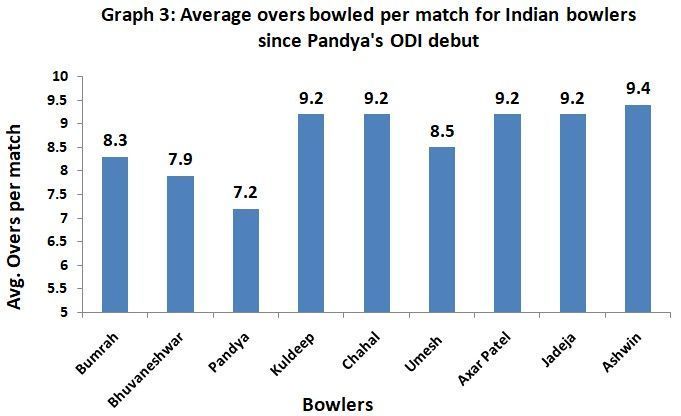
Before looking to analyse Pandya’s bowling exploits, it is essential to understand the role he plays in the bowling scheme of things. Pandya has been bowling the least number of overs per match among the 5 main bowlers for India currently. This doesn’t mean he is expensive quite often because his overall economy of 5.56 is pretty good keeping in mind the recent standards. It just means that his role is more of a 5th bowler who can give in 7-8 decent overs every game. He also picks up a wicket every game on average, which is quite good because if the pacers can chip in with a wicket or two each every game, it gives able support to the two spinners who are the primary wicket-takers.
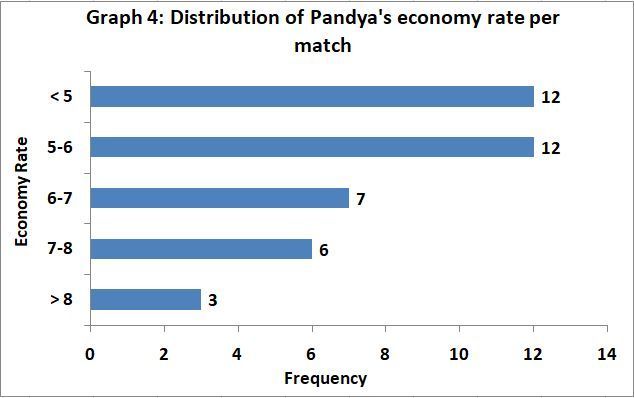
With the modern game heavily skewed towards batsmen, a captain would want his 5th bowler to not get hit for too many, which could release the pressure created by the other bowlers. So if the bowler goes for anything below 6 per over, he can be proud of his performance. Even if he keeps it somewhere within 6-7 runs per over, still it is quite good, keeping in mind the extremely batting-friendly conditions nowadays. The best example would be the conditions for the first two ODIs in the recent India Vs England series, where giving about 70 in your 10 overs would mean you’ve done quite well as a bowler. Pandya actually has done well, economy wise on 75% of the occasions, which is quite commendable.
He has also been quite handy as a partnership breaker with about 1/5th of his wickets (8 out of 40) breaking 50+ partnerships. Apart from that, he has regularly broken developing partnerships too (30-50) which would have hurt the batting side as well. Taking all this into consideration, one can safely conclude that Pandya has been quite useful as a bowler too.
#3. FIELDING
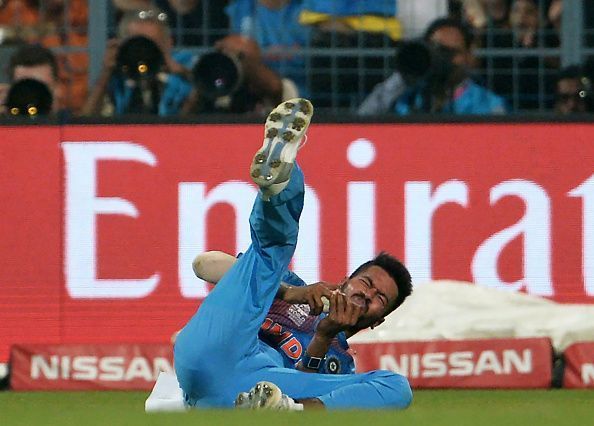
Fielding is definitely one aspect of the game which Pandya would pride himself on. His heroics in the field are not new as he has time and again shown us his extraordinary fielding abilities. Be it his diving stunner at the boundary to remove Guptill, or his superman effort to save a six against Australia at the SCG or his run out of Amla in the second test in recently concluded test series against South Africa, he has proved his worth in the field in all the formats. He is one of the safest fielders when he controls the mid-on/off and long-on/off positions. His quick running and tall stature, that enables him to cover ground quickly and his strong arm makes him a very dangerous prospect in the field for the opposition batsmen.
Overall, in the past 2 years, Hardik Pandya has shown tremendous growth as a cricketer and his ODI performances in all aspects have been impressive. But he too, like many others, has his own set of issues to focus upon. For example, he needs to be more consistent as a batsman in future and he needs to improve his bowling slightly, especially on flat tracks to ensure that he doesn’t leak runs. But despite all this, he seems a very exciting player who is getting better by the day and his progress is very important to his side. This is not only because he has multiple dimensions to his batting, but also due to the fact that he is an effective bowler and a fantastic fielder. Such a player would be a big asset for the team any day. For a player who is as passionate about the game as Hardik, you would imagine that he would only get better with every series. And if he can do that, he would certainly be one of the X-factors for India in the World Cup next year.